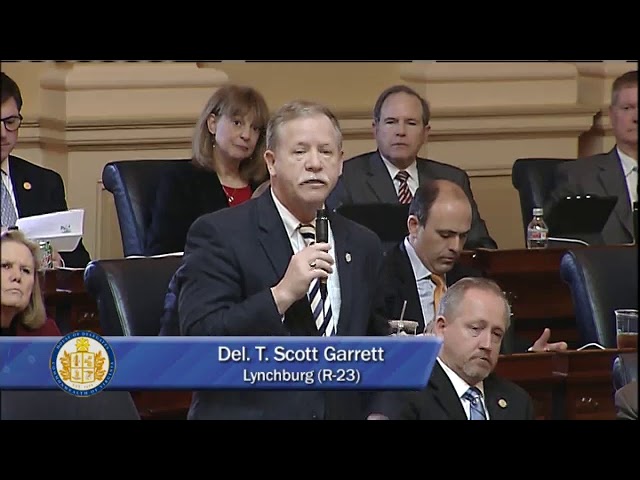Delegate Garrett said it is time for him to serve “full-time in my role as a husband to Whitney and a father to our two teenagers, Tyler and Haley Gray,” because “God has granted me no greater title than that of ‘Dad.'”

Virginia's Public Square
Virginia's Public Square

Delegate Garrett said it is time for him to serve “full-time in my role as a husband to Whitney and a father to our two teenagers, Tyler and Haley Gray,” because “God has granted me no greater title than that of ‘Dad.'”

With a rules fight looming in Virginia’s House of Delegates, one lawmaker took to the floor on Monday to push back against an effort which he called a “proxy fight for unrestricted access to abortion.”
Delegate Scott Garrett (R-Lynchburg), rose against a Friday effort championed by colleague Hala Ayala (D-Woodbridge) to change chamber rules and revive a failed measure hailed by abortion advocates to require taxpayer funding for unrestricted access to taxpayer funded abortion.
Ayala’s effort to suspend the rules and advance the Equal Rights Amendment (ERA) to the floor, following its repeated failures in committee, would constitute an unprecedented effort to discharge the committee system under which the chamber operates, targeted towards one specific measure.
“We already know, Mr. Speaker, that the 14th Amendment the United States Constitution applies the equal protection of the laws to all people regardless of sex,” said Garrett. “What could this additional amendment really be about, Mr. Speaker?”
“The next few days will give us the opportunity to answer that question by saying out loud what this has been about all along: a proxy fight on unrestricted access to abortion. I think we’re all well aware of the shock and outrage that emerged not only across the Commonwealth but across the country, after the details of House bill 2491 became widely known. That legislation, Mr. Speaker, erased all meaningful restrictions on late term abortion, allowing abortion up to the moment of birth for the most tenuous of reasons.”
Referencing HB2491, the controversial 40 week abortion bill filed by Delegate Kathy Tran (D-Springfield), which ultimately failed, Garrett warned that the provisions of the bill could be mandated by the courts if the ERA were to be enacted.
Garrett cited three court cases where state-level provisions similar to the ERA were used by courts to overturn abortion restrictions.
In a case out of Texas from 2001, Art. I, § 3a of the state’s constitution was used to overturn restrictions on taxpayer funding for abortion. Previously, Texas law limited state funded abortion services to cases involving rape, incest, or a threat to the life of the mother. Under this language, courts ruled that restriction, one supported by most Americans, to be invalid.
Garrett also cited a case from Connecticut, in which Art. I, § 20 of the state’s constitution was as the basis for ruling state restrictions on abortion invalid.
In a third case he referenced, from New Mexico, N.M. Right to Choose/NARAL, Abortion & Reprod. Health Servs., Planned Parenthood of the Rio Grande v. Johnson (126 N. M. 788), the Supreme Court of New Mexico ruled that the state constitution required taxpayer funding for elective abortion, on account of language nearly identical to the proposed ERA (Art. II, § 18).
“Based on the independent grounds provided by the Equal Rights Amendment to Article II, Section 18 of the New Mexico Constitution, we affirm the district court’s orders granting Plaintiffs’ motion for summary judgment, permanently enjoining the Department from enforcing its May 1995 revision of Rule 766, and awarding costs to Plaintiffs,” ruled the court.
These cases predate a ruling handed down in Alaska this week following a similar pattern.
“Brought by Planned Parenthood of the Great Northwest, the lawsuit argued that the regulations violated the equal protection clause of Alaska’s constitution by discriminating against women choosing to have an abortion,” reported Jurist.org, a legal research collaboration affiliated with the University of Pittsburgh.
“Under the contested law, abortions would only be covered under Medicaid though additional requirements. The 2013 regulation, 7 AAC 160.900(d)(30), required a physician to certify an abortion only for circumstances permitted under the Hyde Amendment or if deemed medically necessary. The Hyde Amendment only allows federal funding for an abortion when the mother’s life is endangered by a full-term pregnancy term or the pregnancy resulted from rape or incest.”
Ayala’s rules change effort comes on the heels of a Democratic push to loosen restrictions on abortion as a major plank of the party’s campaign efforts for the fall elections.
Abortion first became an issue in the 2019 campaign cycle when Democratic leaders, including Governor Ralph Northam, Lieutenant Governor Justin Fairfax, and Attorney General Mark Herring held a press conference with over a dozen lawmakers, announcing that Tran’s Repeal Act would be a “priority” on the campaign trail.
In that announcement, Northam and other Democrats looked forward to a Democratic majority in the House of Delegates and the Senate of Virginia which would pass the legislation and send it to his desk for approval.
“So when can’t change peoples minds, we need to change seats,” said Northam.
“We need a pro-choice majority in the General Assembly,” added Herring.
That event, held on January 17th, predated Tran’s now-infamous committee testimony by eleven days.
The Repeal Act enjoys strong support from Democratic lawmakers, having received the sponsorship of a majority of Democratic members in the General Assembly.
When introduced, 54% of them signed on as sponsors, though that number fell to 51% after Delegate Dawn Adams (D-Henrico) withdrew her sponsorship following the backlash, telling constituents in an email that she failed to read the bill.
Last Friday, the deadline for withdrawing sponsorship passed. 34 Democrats remained active sponsors of the failed legislation.
With abortion now a top issue for the fall, Ayala’s unprecedented push to bypass the House’s committee system through a rules change represents the last opportunity for Democrats to deliver a legislative victory for pro-abortion voters.
Republicans have pledged to fight the attempt, disagreeing both with the underlying policy and what they called an “affront” to the rules targeted at one specific legislative measure.
In closing, Garrett remarked that everyone in the chamber would support ratifying the Equal Rights Amendment were it not for the provision expanding taxpayer funded late term abortion.
“So in in closing, Mr. Speaker, let me be clear on one thing: if this amendment before us were just about equality, and its advocates could prove that it would not do exactly what the courts have already found it does, then I would be the first person to vote for it because I have a wife and a daughter, and I believe they deserve the same rights and respect that all people should receive,” he said. “And I believe you would not find a single dissenting vote in this house were that the case.”
“But Mr. Speaker, I wholeheartedly believe that this is not what this amendment is about.”
Garrett concluded by urging the measure’s defeat.

“Misinformation has been circulating on where Virginia Democrats stand on issues related to women’s reproductive health,” said Governor Ralph Northam (D) at a Thursday afternoon press conference. The situation began Tuesday morning after shocking video was released from a House subcommittee meeting detailing a Democratic lawmaker speaking about her late-term abortion bill.
H.B. 2491, introduced by Delegate Kathy Tran (D-Springfield), would repeal restrictions on third trimester abortions, allowing abortion doctors to self-certify the necessity of late-term procedures, eliminate informed consent requirements, repeal abortion clinic health and safety standards, permit late-term abortions to be performed in outpatient clinics, remove ultrasound requirements, and eliminate Virginia’s 24-hour waiting period.
In the days since the development, pro-life advocates from across the country have spoken out against the legislation, including President Donald Trump.
“I’m surprised that he did that, I’ve met him a number of times,” Trump said of the governor. The commander in chief also said that Delegate Tran’s remarks were “terrible,” after having seen the video.
At the press conference this afternoon, beside members of the Virginia Democratic leadership, Governor Northam said that he was there “to set the record straight.”
“There’s a fundamental difference between us and Republicans in what we believe on a woman’s right to choose. We believe legislators, most of whom are men, should not be making decisions about women’s choices for their reproductive health.”
Northam added that the Virginia GOP is trying to “score points any way they can.”
“Virginia Democrats know we are better than that,” he added.
Attorney General Mark Herring (D) spoke next. He started off by saying that “desperation can be ugly. And what we saw yesterday from Republicans was desperate and ugly.” He stated that claims from GOP lawmakers that Governor Northam supports infanticide “would be laughable if it wasn’t such a grotesque idea.”
During a Wednesday morning address on WTOP’s “Ask The Governor” segment, Northam commented on the situation surrounding the response to Delegate Tran’s bill by saying the widespread reaction was “blown out of proportion.”
Explaining it himself, he said the following:
“If a mother is in labor, I can tell you exactly what would happen. The infant would be delivered. The infant would be kept comfortable. The infant would be resuscitated if that’s what the mother and the family desired, and then a discussion would ensue between the physicians and the mother.”
Conservatives across the Commonwealth and the U.S. quickly condemned Northam’s rhetoric, charging that he “supports infanticide.”
During the press conference, when asked about what he said and if it had been taken out of context, he responded with, “I don’t have any regrets….I regret that those comments have been mischaracterized.”
Regardless, it spurred Republican lawmakers to give emotional speeches on the floor of the House the following day.
Speaker of the House Kirk Cox (R-Colonial Heights) made a rare and powerful speech after he stepped of the dais.
“I will never stop fighting for the promise of life as long as I hold a gavel, as long as I can speak into this microphone, as long as I have the privilege of this floor. I promise to fight for the promise of life,” he said.
Delegate Scott Garrett (R-Lynchburg) also gave a personal story.
“Mr. Speaker, I’m not going to let anyone take the life of my son, and I’m not going to vote to allow other people to take the lives of other people’s sons,” he proclaimed.
As Virginians continue to reel from this week’s developments, one comment from House Majority Leader Todd Gilbert (R-Shenandoah) rings very true.
“I think what my Democratic colleagues are most concerned about is what this moment actually revealed. It was a moment of unbridled honesty about their agenda, and their legislation, and what it actually does.”
Meanwhile, the RTD’s Graham Moomaw asked Democratic minority leader Del. Eileen Filler-Corn (D-Fairfax) whether they had any intentions of bringing the infanticide bill back should they capture the majority in the November 2019 elections:
When asked if Democrats would pursue legislation similar to Tran’s if they take control of the House next year, Filler-Corn said that “there’s a lot of support for this type of legislation.”

“I did not wake up this morning to stand,” said Delegate Scott Garrett (R-Lynchburg) on his third point of personal privilege on the House floor in 10 years as a legislator in the Virginia legislature. After Speaker of the House Kirk Cox (R-Colonial Heights) gave a rare, highly-emotional speech about reaffirming his promise to fight to protect the lives of unborn children, Delegate Garrett has a personal story of his own.
Wednesday was soul-stirring day on Bank Street. Just one day before, a Democratic legislator made headlines for her speech about a bill she introduced that would lead the Commonwealth towards the ways of New York in repealing restrictions on abortion, including terminations up until the moment of birth.
H.B. 2491, patroned by Delegate Kathy Tran (D-Springfield), would repeal restrictions on third trimester abortions, allowing abortion doctors to self-certify the necessity of late term procedures, eliminate informed consent requirements, repeal abortion clinic health and safety standards, permit late term abortions to be performed in outpatient clinics, remove ultrasound requirements, and eliminate Virginia’s 24-hour waiting period.
The response from legislators in the 24 hours since has been gripping, poignant, and emotional.
“As you all know, I’m a trauma surgeon,” Garrett said. “In 1980, almost 40 years ago, I started my education and training.”
“I have literally seen everything that can be done by a human to another human. I’ve seen men and women shot, stabbed, brutally murdered, raped, mutilated, acid thrown into their face. I’ve seen people strangled to death, and I’ve taken care of a lot of those folks,” the delegate explained.
“I have never, in 62 years on this Earth…the bill that was before us…” Garrett said has he attempted to collect his emotions in an almost silent House of Delegates.
“Mr. Speaker,” he continued, “let me tell you the story of Billy.
“In 1988, as a chief resident of pediatric surgery at the University of Florida, Billy was born at 24 weeks,” Garrett said.
“He had a hole in his heart. He had a connection between his windpipe and his esophagus, so whenever he swallowed, he was drowning himself. And he had 37 segments of his small intestine that were completely blocked.”
“I operated on that boy for 18 hours,” the delegate explained. “With the help of an amazing team, and these two hands the good Lord gave me, sir, we fixed the hole in that little boy’s heart. We closed the connection so that he could breathe normally. And I removed 37 segments of that little boy’s intestine so that intestinal function could normalize.”
“That was 31 years ago, Mr. Speaker,” Garrett said.
Then, the Lynchburg Republican legislator began another story – one that hit him closer to home.
“A lady in my district, a constituent of mine,” Garrett continued, “16 years ago, 35 years old, she became pregnant. If you’re going to deliver at 36 years or older, you are deemed to be at high risk.”
“We didn’t have a high-risk OB doctor in Lynchburg,” Garrett said, explaining on the floor of the House that they had to travel to Charlottesville’s University of Virginia medical center for care.
“The standard of care then…was to do an ultrasound of the baby, of the developing fetus, and they measure the fat pad at the base of the back of the neck, and they’re looking for one number – three millimeters,” he added.
“Three millimeters,” he said again.
“If that fat pad is thicker than three millimeters, Mr. Speaker, she was told that there was a higher than 80 percent chance that that baby would be born with neurologic deficits.
“Three millimeters, Mr. Speaker,” Garrett said gain.
“That was 16 years ago.”
Clenching his emotions, he stated, “My 16-year-old son is a good boy, Mr. Speaker. He’s a good student.”
“Many of you all met him three years ago when he was a Senate page. He’s a wonderful athlete.”
“He makes his father and his mother proud,” he told the 99 other delegates.
“And for three millimeters,” Garrett continued, “someone would have taken the life of my son.”
“Mr. Speaker, I’m not going to let anyone take the life of my son, and I’m not going to vote to allow other people to take the lives of other people’s sons.”

The one-two legislative strategy by Delegates Scott Garrett and Kathy Byron would prohibit taxpayer funding of abortion providers in this year’s budget and begin working towards prohibiting it in Virginia’s constitution. The move comes as Governor Northam and Democratic lawmakers proposed a sweeping repeal of abortion restrictions, including on late term abortions in the third trimester.